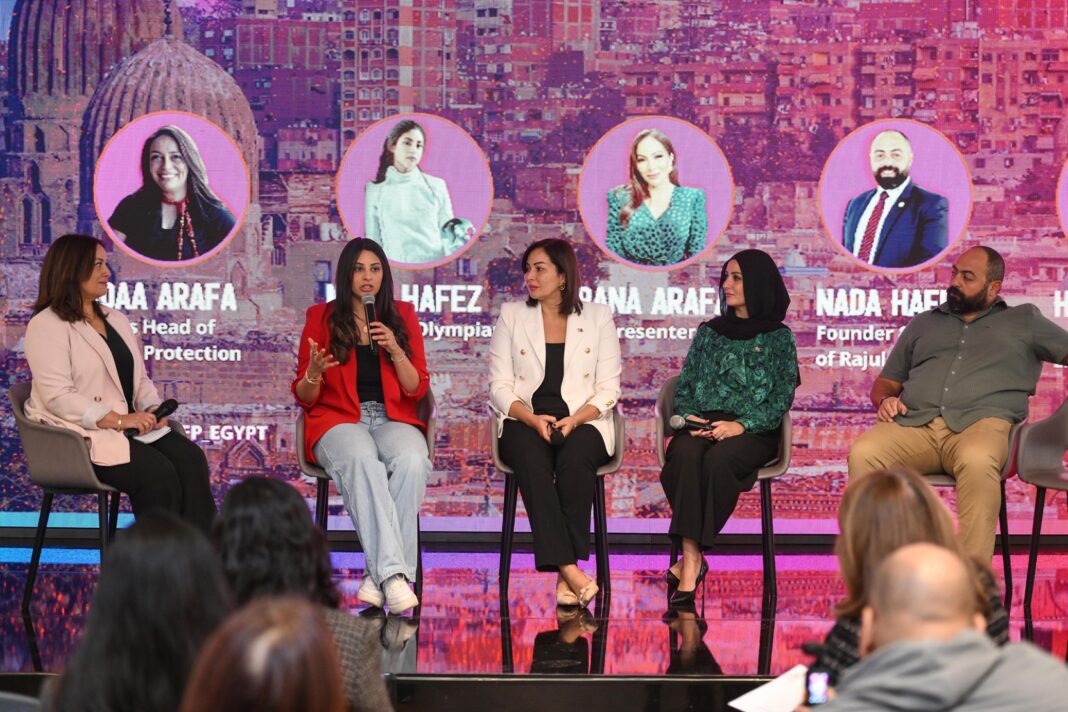Globally, one in three women will experience gender-based violence (GBV) in their lifetime, but in many cases, the harm is not just physical. In Egypt, where women’s economic participation stands at just 15.9 percent, violence often takes economic forms that directly affect survival.
It is therefore no surprise that at the intersection of two global crises, GBV and food insecurity, lies an often-overlooked but critical reality: the economic and social inequities that render women vulnerable to both.
The United Nations World Food Programme (WFP) in Egypt on 10 December culminated its groundbreaking 16-day digital campaign, مش بس الضرب, which roughly translates to the violence is not just physical, designed to shed light on the hidden forms of GBV and their linkages to food security.
The campaign, which spanned 25 November to 10 December, united voices from diverse fields to spark dialogue and inspire action, with insights from 10 experts
The campaign’s message was clear: GBV is not just physical, it is psychological, economic, and systemic.
By linking it to food security, the initiative underscored how societal inequities perpetuate cycles of violence and deprivation, particularly for women in vulnerable communities.
According to a 2023 United Nations report, rural women are disproportionately affected by food insecurity, with nearly 60 percent reporting difficulties in providing adequate nutrition for their families.
The reasons are multifaceted: lack of access to agricultural inputs, limited control over household finances, and societal restrictions that prioritize male authority. According to WFP, addressing these barriers is not just a moral imperative; it is an economic necessity.
The WFP’s campaign featured an interactive panel discussion and contributions from four influential figures, including athletes, media professionals, mental health experts, and advocates in an event in Downtown Cairo on 9 December.
The panel, attended by members of the diplomatic and donor communities, alongside private sector leaders, explored actionable solutions to dismantle the structural barriers that sustain GBV and its intersection with food insecurity.
“Part of our work with the Egyptian Government underscores the strength of partnerships in addressing the complex intersection of food security and gender-based violence,” said Jean-Pierre de Margerie, WFP Egypt Representative and Country Director.
He highlighted WFP’s She Can initiative, which has empowered over 70,000 rural women in Egypt through entrepreneurship training and micro-loans.
Empowered women are more likely to invest in their children’s education, health, and nutrition, creating a ripple effect that extends across generations.
“By boosting household incomes and improving self-esteem, these efforts are not only reducing women’s vulnerability to violence but are also creating lasting change,” he added.
Hidden Forms of Violence
A central theme of the campaign was highlighting lesser-known forms of GBV, such as economic and psychological violence. Doaa Arafa, a gender expert at WFP highlighted how many women face restricted access to capital, assets, and secure jobs, particularly in rural areas where patriarchal norms are more entrenched.
“These structural inequalities often lead to food insecurity for women and their children, compounding their vulnerability to GBV,” Arafa explained. She pointed to WFP’s economic empowerment programs as crucial interventions. “Through initiatives like She Can, we have seen women gain financial independence, breaking cycles of violence and improving their families’ well-being.”
Arafa also underscored the pressing need to address the systemic barriers women face in rural Egypt.
“Economic violence is one of the most insidious forms of GBV,” Arafa explained. “It denies women access to the very resources they need to survive, whether it’s land, credit, or education. This doesn’t just affect individual women; it impacts entire families, perpetuating cycles of poverty and malnutrition.”
Arafa cited the She Can program as a shining example of how targeted interventions can break these cycles. “When women gain financial independence, we see dramatic shifts in their ability to feed their families and secure brighter futures for their children. It’s not just about the money, it’s about empowerment, dignity, and breaking free from abuse.”

Nada Hafez, an Olympic fencer who competed in the 2024 Paris Games while seven months pregnant, brought her own narrative of resilience to the campaign.
“Competing on a global stage while carrying my child was a testament to the strength that women possess,” Hafez said. “But strength isn’t just physical. It’s about overcoming barriers, be they societal expectations or economic constraints.”
Hafez highlighted the economic dimensions of GBV within sports, noting how female athletes often face unequal access to resources and opportunities.
“When sponsors or governing bodies withhold funding, it limits not just our performance but our basic needs, like proper nutrition. These challenges mirror those faced by women in other industries. Violence, in all its forms, prevents us from reaching our full potential,” she added.
Moustafa El Nahas, a psychiatrist, delved into the less visible effects of GBV: chronic anxiety, depression, and post-traumatic stress disorder (PTSD), which can hinder survivors’ ability to work or care for their families.
“When survivors are unable to work or care for their families due to psychological trauma, it creates a vicious cycle,” El Nahas added. “Breaking this cycle requires holistic approaches that address both the emotional and material needs of survivors.”
Children in GBV-affected households are particularly vulnerable. Research indicates that children in such environments are at a higher risk of malnutrition due to disrupted meal schedules and the caregiver’s mental health struggles.
A Multifaceted Approach
The WFP campaign emphasized the importance of addressing GBV through multiple channels, from social behavioral change (SBC) campaigns to gender-sensitive food distribution programs. These initiatives, conducted in collaboration with the Egyptian Government, have reached thousands of people in rural areas, addressing harmful practices such as early marriage and female genital mutilation.
“We’ve seen real-life stories of transformation,” Arafa said. “Parents deciding to keep their daughters in school, delaying marriages, and reporting FGM cases—these are the changes that ripple through communities.”

Globally, one in three women experience physical or sexual violence in their lifetime, with many also subjected to economic and psychological abuse, according to the World Health Organization. In Egypt, rural women face unique challenges: early marriage, limited access to credit, and exclusion from private-sector opportunities. These factors not only perpetuate GBV but also jeopardize food security for families.
The stakes are high. Studies show that economic empowerment can be a game-changer. Women who control financial resources are less likely to experience violence and more likely to invest in their children’s education and nutrition, creating a virtuous cycle of resilience.
Arafa also emphasized the role of media in shaping narratives around GBV.
“We can either perpetuate challenges or dismantle them,” she said. “By showcasing real stories of resilience, we can inspire action to combat gender-based violence and create a more equitable future for women.”
Michel Gerges, founder of Rajul, an initiative focused on reimagining masculinity, called for a reevaluation of societal norms. “Understanding and addressing the perceptions of masculinity that drive GBV is critical,” he said. “Only then can we foster healthier communities.”
As the campaign draws to a close, its impact resonates beyond Instagram posts and panel discussions. The message is clear: tackling GBV and food insecurity requires collective action, from grassroots efforts to governmental policies. Programs like WFP’s She Can and SBC initiatives have shown that change is possible when women are empowered with resources and knowledge.
Hafez summed it up best: “When we challenge societal norms and give women the tools to succeed, we are not just empowering individuals—we are building stronger, more resilient communities.”


